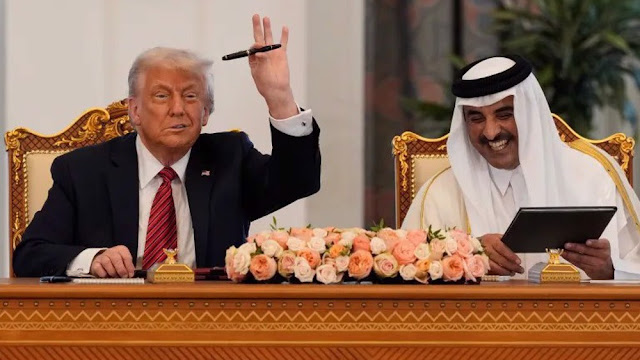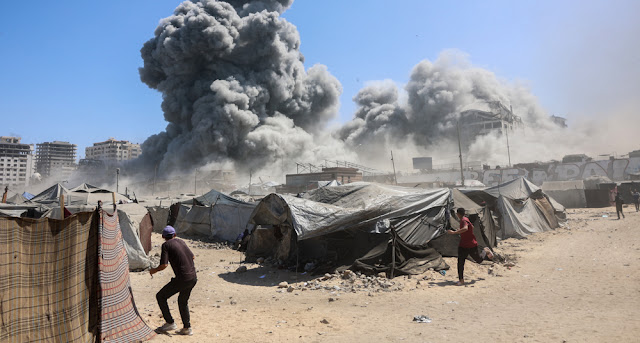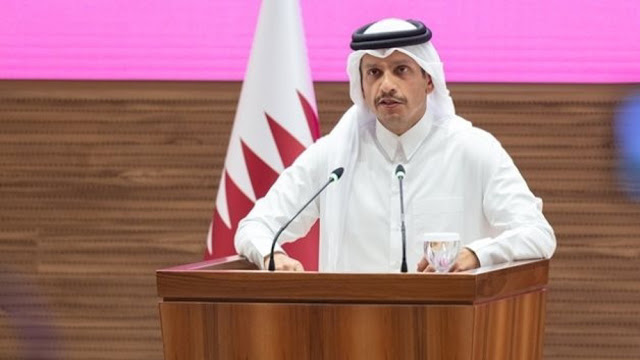US President Donald Trump holds up a pen given by Qatar’s Emir Sheikh Tamim bin Hamad Al Thani in Doha, Qatar, on May 14, 2025. (Photo by AP)
In a development that has sparked significant diplomatic ripples across the Middle East, U.S. President Donald Trump has publicly addressed Israel’s recent military strike targeting the leadership of the Palestinian resistance movement Hamas in Doha, the capital of Qatar. The attack, described by regional and U.S. officials as a bold and controversial move by Israel, has raised questions about coordination between Washington and its close ally, Tel Aviv, as well as the implications for U.S.-Qatar relations. Despite claims from Trump that he had no role in the decision to launch the attack, reports indicate that the United States was informed of Israel’s plans in advance, prompting a complex response from the White House that sought to balance diplomatic relations with both Israel and Qatar.
The Middle East Eye (MEE), a prominent news and analysis outlet focused on the region, reported that both regional and U.S. officials confirmed Washington’s prior notification of the Israeli operation. The White House later corroborated this, acknowledging that it was aware of Israel’s intentions before the strike took place. However, the Trump administration has been quick to distance itself from the decision-making process, emphasizing that the operation was conceived and executed solely by Israel. This delicate diplomatic dance reflects the broader challenges facing the United States as it navigates its relationships with key allies in a volatile region.
The Strike and Its Immediate Aftermath
The Israeli attack, which targeted senior figures within Hamas’s leadership structure in Doha, was a significant escalation in the ongoing conflict between Israel and the Palestinian resistance movement. Hamas, designated as a terrorist organization by the United States, Israel, and several other countries, has long been a focal point of Israeli military and intelligence operations. The decision to carry out a strike in Qatar, a sovereign nation and a key U.S. ally, has raised eyebrows and drawn condemnation from various quarters, particularly given Qatar’s role as a mediator in regional peace efforts.
According to sources cited by MEE, the operation was meticulously planned, with Israel notifying the United States of its intentions beforehand. The White House, in its official response, confirmed this prior notification but sought to clarify the U.S. stance. White House Press Secretary Karoline Leavitt addressed reporters, reading from a prepared statement that outlined President Trump’s position on the matter. “The president views Qatar as a strong ally and friend of the United States, and feels very badly about the location of this attack,” Leavitt said. She further noted that Trump had directed his top envoy, Steve Witkoff, to warn Qatar of the impending strike, indicating an effort to mitigate potential fallout with the Gulf nation.
This warning, however, has done little to quell concerns about the implications of Israel’s actions. Qatar, a small but influential player in Middle Eastern geopolitics, has positioned itself as a mediator in numerous regional conflicts, including efforts to broker peace between Israel and Palestinian factions. The strike on its soil represents a direct challenge to its sovereignty and could undermine its credibility as a neutral arbiter. Moreover, the attack has strained U.S.-Qatar relations, given Washington’s close partnership with Doha in areas such as counterterrorism, energy cooperation, and military basing.
Trump’s Public Statements and Social Media Response
In the hours following the strike, President Trump took to his social media platform, Truth Social, to address the situation directly. In a series of posts, he sought to clarify his administration’s position and distance himself from Israel’s decision. “Unilaterally bombing inside Qatar, a Sovereign Nation and close Ally of the United States, that is working very hard and bravely taking risks with us to broker Peace, does not advance Israel or America’s goals,” Trump wrote. He emphasized that the decision to strike in Qatar was made solely by Israeli Prime Minister Benjamin Netanyahu and was “not a decision made by me.”
Trump’s posts underscored his view of Qatar as a vital partner, reiterating that he considers the Gulf nation a “strong ally and friend of the US.” He expressed regret over the location of the attack, noting that it complicated ongoing diplomatic efforts in the region. The president’s comments were consistent with the White House’s official statement, which sought to balance support for Israel’s security concerns with the need to maintain strong ties with Qatar.
Trump’s decision to publicly address the issue on Truth Social reflects his administration’s approach to communication, which often blends traditional press briefings with direct engagement on social media. By taking to the platform, Trump aimed to shape the narrative surrounding the strike and ensure that his administration’s perspective was clearly communicated to both domestic and international audiences. However, his explicit disavowal of involvement in the decision has raised questions about the extent of coordination between the U.S. and Israel, two nations with a historically close relationship.
Israel’s Position and Netanyahu’s Response
The Israeli government, for its part, has maintained that the strike was an independent operation, conceived and executed without external input. In a statement issued by the office of Prime Minister Benjamin Netanyahu, Israel took full responsibility for the attack. “Israel initiated it, Israel conducted it, and Israel takes full responsibility,” the statement read, describing the operation as “a wholly independent Israeli operation.”
Netanyahu’s office did not provide detailed information about the targets or the outcomes of the strike, but Israeli officials have privately indicated that the operation was aimed at disrupting Hamas’s leadership structure and preventing potential attacks against Israel. The decision to target Hamas leaders in Qatar, however, has been met with criticism, given the potential for diplomatic fallout and the risk of escalating tensions in an already volatile region.
Israel’s relationship with Qatar has been complex, marked by periods of cooperation and tension. Qatar has played a significant role in channeling funds to Gaza for humanitarian purposes, often with Israel’s tacit approval, as part of efforts to stabilize the Palestinian territory. However, Doha’s hosting of Hamas leaders has long been a point of contention, with Israel accusing Qatar of providing a safe haven for individuals it considers terrorists. The strike in Doha appears to reflect Israel’s frustration with this arrangement and its determination to pursue Hamas leadership wherever it may be located.
Qatar’s Role and Reaction
Qatar, caught in the crossfire of this incident, has yet to issue a detailed public response, but early indications suggest that the attack has caused significant concern in Doha. As a nation that prides itself on its diplomatic agility and ability to mediate between conflicting parties, Qatar finds itself in a precarious position. The strike not only violates its sovereignty but also undermines its efforts to maintain a neutral stance in the Israeli-Palestinian conflict.
Qatar has been a key player in regional diplomacy, hosting negotiations between various factions and serving as a hub for international dialogue. Its role in brokering ceasefires and facilitating prisoner exchanges between Israel and Hamas has earned it praise from some quarters, but it has also drawn criticism from those who view its hosting of Hamas leaders as tacit support for the group. The Israeli strike in Doha could complicate Qatar’s ability to maintain this delicate balancing act, potentially forcing it to reassess its approach to hosting Palestinian factions.
The U.S.-Qatar relationship, which has deepened in recent years, adds another layer of complexity to the situation. Qatar hosts the Al Udeid Air Base, one of the largest U.S. military installations in the Middle East, and has been a key partner in counterterrorism efforts. The Trump administration’s public expressions of support for Qatar suggest an effort to preserve this partnership, but the incident may test the resilience of bilateral ties.
Broader Geopolitical Implications
The Israeli strike in Qatar and the U.S. response highlight the intricate web of alliances and rivalries that define Middle Eastern geopolitics. The United States, as a superpower with significant interests in the region, must navigate a complex landscape in which its allies often pursue conflicting agendas. Israel’s unilateral actions, while consistent with its long-standing policy of targeting Hamas, risk destabilizing the region and complicating U.S. efforts to promote stability and counter Iranian influence.
Iran, a key supporter of Hamas, has yet to comment officially on the strike, but its response could further escalate tensions. Tehran has long viewed Qatar as a rival in the Gulf, and any perception of Qatari weakness could embolden Iran to assert greater influence in the region. At the same time, the strike may strengthen Iran’s narrative of Israeli aggression, potentially rallying support for Hamas and other Palestinian factions.
The incident also raises questions about the future of U.S.-Israel relations under the Trump administration. While Trump has been a staunch supporter of Israel, his public criticism of the strike in Qatar suggests a willingness to assert U.S. interests when they diverge from those of its ally. This dynamic could shape future interactions between Washington and Tel Aviv, particularly as the U.S. seeks to maintain its credibility as a mediator in the region.
The Role of Diplomacy in Mitigating Fallout
In the wake of the strike, diplomatic efforts will be critical to preventing further escalation. President Trump’s decision to dispatch Steve Witkoff to warn Qatar of the attack indicates an awareness of the need to manage the fallout with Doha. Similarly, Trump’s reported conversations with both Netanyahu and Qatari Emir Tamim bin Hamad Al Thani suggest an effort to maintain open lines of communication with key stakeholders.
For Qatar, the incident presents an opportunity to reinforce its role as a mediator, but it will need to carefully calibrate its response to avoid alienating either the U.S. or Israel. A strong condemnation of the strike could strain relations with Israel, while a muted response might be perceived as weakness domestically and regionally.
The United States, meanwhile, faces the challenge of balancing its support for Israel’s security with its broader strategic interests in the Gulf. The Trump administration’s emphasis on Qatar as a “strong ally and friend” reflects an understanding of the need to preserve this partnership, particularly in light of Qatar’s role in hosting U.S. military assets and facilitating regional diplomacy.
Domestic and International Reactions
Domestically, the strike has sparked debate within the United States about the extent of U.S. involvement in Israel’s military operations. Critics of the Trump administration have questioned why Washington did not do more to prevent the attack, given its prior notification. Supporters, however, argue that the administration’s hands were tied, as Israel has a history of acting unilaterally in pursuit of its security interests.
Internationally, the strike has drawn mixed reactions. Some of Israel’s allies have expressed understanding of its need to target Hamas, while others have criticized the violation of Qatar’s sovereignty. The Arab League and other regional bodies may issue statements in the coming days, potentially shaping the broader narrative around the incident.
Looking Ahead
As the dust settles on this latest chapter in the Israeli-Palestinian conflict, the focus will shift to the long-term implications of the strike. For Israel, the operation may achieve short-term tactical gains by disrupting Hamas’s leadership, but it risks alienating key partners and escalating tensions in the region. For Qatar, the incident is a test of its diplomatic resilience and ability to maintain its role as a regional mediator. And for the United States, the strike underscores the challenges of managing alliances in a region fraught with competing interests.
President Trump’s efforts to distance himself from the decision while reaffirming U.S. support for Qatar reflect the delicate balancing act required in Middle Eastern diplomacy. As the situation evolves, the international community will be watching closely to see how the U.S., Israel, and Qatar navigate the fallout and whether this incident will have lasting repercussions for the region’s fragile stability.






